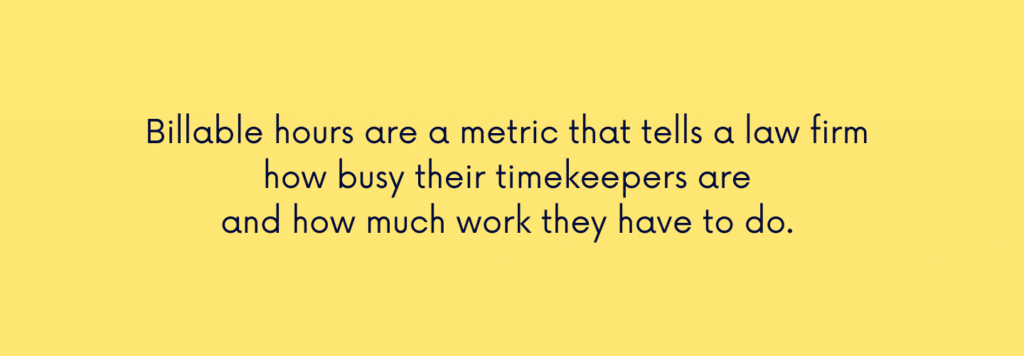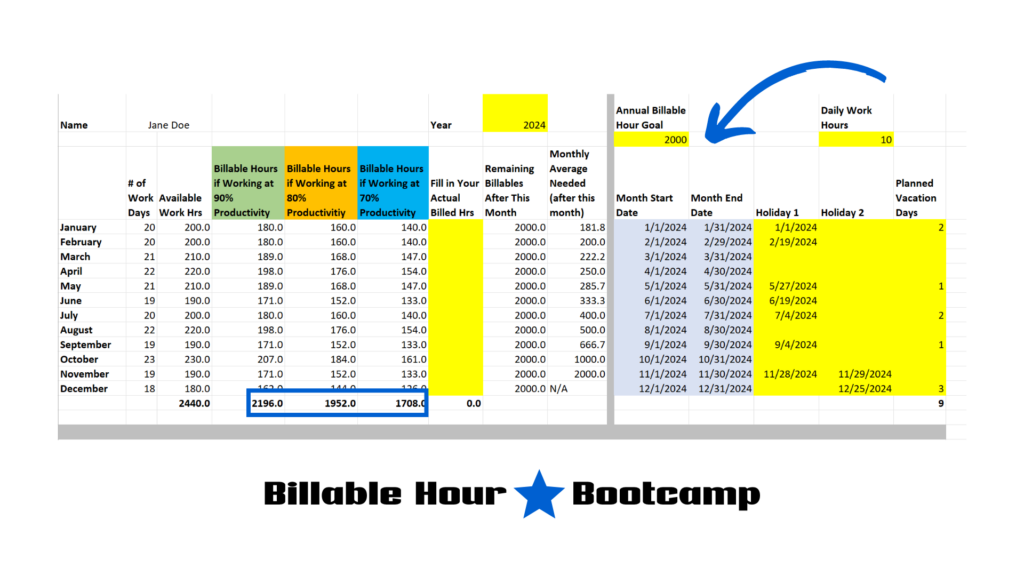What are billable hours?
In the legal industry, billable hours are the time a lawyer spends on tasks for a client. You can charge the time spent on these tasks to the client. This can include conducting research, drafting legal documents, preparing for trials, and other substantive work.
Every hour or part of an hour worked for a client is tracked. This time is then billed to the client at a set hourly rate. For attorneys and paralegals, billable hours are critical to both revenue generation and the measurement of productivity and efficiency.
Because your billable time contributes directly to a law firm’s revenue, maximizing these hours while maintaining quality work is a common goal.
Legal professionals often strive to meet or exceed their firm’s annual goal, a benchmark that can significantly impact performance evaluations, bonuses, and promotions.
Achieving these targets while balancing client needs and professional responsibilities requires a clear understanding of what is considered billable versus non-billable work.

Attorney billable hours
Attorney billable hours play a significant role by generating revenue for law firms.
Attorneys typically track hours spent on client tasks, with a goal to meet or exceed the firm’s annual requirement.
Billing rates and hours are often reviewed during performance evaluations and can impact compensation. It can also impact whether or not an associate is promoted to a partner position in the law firm.
For attorneys, maximizing billable time also means actively managing client expectations and ensuring that each hour spent adds value to the case.
By setting clear boundaries for non-billable activities and honing time management skills, attorneys can maintain productivity while meeting firm expectations.
Attorneys must balance meeting the firm’s billable goals with bringing in new clients. This is especially true for associates who are on the partnership path.
Paralegal billable hours
Paralegal billable hours are the same as it is for the attorneys, except that paralegals are typically billed at a lower rate because of their support role.
Paralegals typically have a lower annual billable requirement because paralegals may also juggle more non-billable administrative duties because they usually do not have the same level of secretarial support that the attorneys have.
While paralegals have lower billable rates and lower billable expectations, they can still be a profit center for a law firm if they are managed effectively.
Time management skills are essential for every profession, but they rise to a new level of importance when you are also held accountable for meeting a billable hour goal as a paralegal. If you are a paralegal and need some tips, here are 3 Pro Tips for Paralegal Time Management.
How many hours do law firms require?
Law firms usually set a standard number of hours for attorneys and paralegals each year. This number typically ranges from 1,400 to 1,700 hours for paralegals. For associates, the range is usually between 1,700 and 2,200 hours. This annual target translates to about 120 to 180 billable hours per month.
These goals help law firms predict revenue and track employee productivity. Some firms link performance reviews and bonuses to whether professionals meet these hourly targets.
While those ranges are common, the requirement may vary based on firm size, location, and specialty. For example, throughout the years that I’ve been teaching the Billable Hour Boot Camp for law firms, I’ve come across some small firms (3 – 10 attorneys) with annual quotas as low as 1,200 hours per year. I’ve also taught the workshop to “BigLaw” firms (1,000+ attorneys) with annual quotas as high as 1,800 hours for paralegals.
Meeting these targets can be challenging. Balancing billable work, non-billable tasks, and personal time is important. Law professionals often find themselves carefully managing their schedules to stay on track with these goals while avoiding burnout.
Smaller firms or those in specific practice areas may have more flexible requirements.
In contrast, larger firms often expect numbers. For legal professionals, understanding and consistently meeting or exceeding these requirements is key to career growth within their firm.
Billable Hour Boot Camp
Live webinar series starts on September 23, 2025!
The billable hour course and coaching program to help law firm timekeepers:
✅ Exceed their annual billable targets
✅ Reduce their stress related to billable hours
✅ Write better time entries and reduce write-offs
✅ Get more work done in less time so that they have a better work/life balance
For the only time this year, we’re going live for a 5-part webinar series.
Join Ann Pearson as she gives you practical strategies, real-time coaching, and results-driven insights that you can apply immediately.
SEATS ARE LIMITED! Get yours before the doors close.

Billable hours vs. non-billable hours
Differentiating between billable and non-billable hours is crucial for accurate time tracking. Billable time includes any task directly linked to advancing a client’s case or project, while non-billable time involves work that supports the firm but doesn’t specifically relate to a client’s matter.
Common billable activities include:
- Client consultations, meetings and phone calls
- Reviewing client documents
- Court appearances
- Legal research
- Drafting legal documents
- Communications with opposing counsel
Law firms and legal departments often set clear guidelines distinguishing billable from non-billable time. Understanding these boundaries helps clients see what they are being billed for. It also allows firms to make smart choices about how to use their resources.
Many law firm clients also set clear guidelines on what is billable work and what types of tasks are not billable. This is especially true if the law firm has a lot of insurance companies for clients. Insurance companies are known to have strict billing guidelines and extensive auditing procedures for their legal bills.
Non-billable activities can help a firm by improving its efficiency and supporting team development. Even though these hours do not directly make money, they still add value to the law firm.
What is not billable?
Non-billable time include tasks that are important but do not relate directly to client work. Because of this, we cannot charge clients for these hours. These tasks include administrative responsibilities like time entry, email management, scheduling, and attending team meetings.
Despite not being client-focused, these activities are essential to the smooth functioning of any law firm. Depending on the firm’s policies, some will credit some non-billable activities to your annual billable hour total. Those typically include activities like pro bono work and time mentoring or training other staff members.
Unless you are superhuman, you cannot go a whole workday without using the restroom or getting a drink. Therefore, it is impossible to have no non-billable time.
Examples of Non-Billable Time or Administrative Time:
- Entering billable time
- Responding to internal emails
- Filing and organizing
- Staff meetings
- Firm training
- Marketing and networking activities
Although these tasks don’t result in direct billable hours, they are essential to creating a supportive, well-prepared, and ethically responsible legal team.
Professional development activities such as training sessions, legal conferences, and research not tied to a specific client are also generally non-billable.
Legal professionals can spend less time on tasks that don’t generate income. This allows them to focus more on work that helps clients. As a result, they can increase their billable time.
Many firms now provide tools to reduce administrative work. These include time-tracking software, standard templates, and support staff. These tools help attorneys and paralegals focus on increasing their billable hours.

Billable Hours Calculator
A Billable Hours Calculator is a tool for paralegals and lawyers. It helps them estimate their billable hours for the year. This estimate relies on the number of work hours they have available each month.
The calculator adjusts for various factors that affect your work hours. For instance, holidays, vacation days, and personal productivity levels can vary significantly from month to month.
I enjoy sharing the Excel version of this in the Billable Hour Boot Camp. It helps paralegals and associates see how many billable hours they have each month. This information allows them to set a reasonable and realistic monthly goal.
Take a look at the screenshot below, and if you want more information on it, here’s more information on how the Billable Hour Calculator works.
Here is a screenshot of the Billable Hours Calculator:

Tracking Billable Time
Tracking billable time accurately is crucial for fair client billing and for meeting firm performance metrics.
Law firms use different ways to track time. They may use traditional time sheets or advanced software. This software captures activities as they happen.
Each approach requires diligence and accuracy to ensure that all billable tasks are accounted for and that clients receive clear, itemized billing.
Efficient time tracking means organizing hours by task and project. This can show important insights into productivity patterns. It helps legal professionals improve their workflow.
Many firms now use special software to make this process easier. This lets attorneys and paralegals focus more on important work instead of manual time entry.
Billable time tracking chart
How to increase billable time
Increasing billable time involves optimizing work habits, minimizing distractions, and reducing non-billable activities.
Developing efficient workflows, leveraging automation, and utilizing time management tools are some ways to increase productivity.
Many successful legal professionals set specific daily billable hour targets, ensuring that they meet their monthly and annual goals.
Another strategy is to delegate or streamline non-billable tasks, freeing up more time for client-centered work.
Firms may also offer resources, such as support staff or software tools, to assist with administrative duties, ultimately allowing attorneys and paralegals to focus on billable work.
Key strategies to increase billable hours:
- Minimize distractions
- Delegate more administrative tasks
- Consider outsourcing non-billable work
- Prioritize your work day with billable work first
- Enter your billable time immediately
- Establish relationships with other teams for slow times
One key strategy not listed above is to change your mindset around billing your time. Here’s an article I wrote on how to change your billable hour mindset.
Billable hours and tracking your time don’t have to be stressful! Thousands of law firm timekeepers have reduced their stress with our Billable Hour Boot Camp.
Your firm can get group pricing on the Billable Hour Boot Camp, presented as a live webinar series or on-demand at their own pace.
Get information here on the Billable Hour Boot Camp.
If you want to take a deeper dive into paralegal billable hours, listen to the podcast episode I did where I answered listeners’ questions related to billable hours.
FAQ
What are billable hours vs. actual hours?
Actual hours are the hours you are working. For example, you work for 8 hours on Monday.
During those 8 hours, you bill 6.8 of those hours to client files, and the other 1.2 of your day is spent talking to co-workers, filing some papers, grabbing some coffee in the break room, answering a personal phone call, etc.
How many billable hours are in a day?
In an 8-hour work day, most law firms would expect timekeepers to bill 7 of those hours to client files.
That’s an average, and it can vary greatly depending on the firm size, practice area, and your years of experience.
What is the difference between paralegal billable hour goals and associate billable hour goals?
Typically, law firm associates have higher billable hour goals than paralegals. For example, if the paralegals have a 1,600 annual billable hour goal, then the associates’ goal might be 1,900 hours. Additionally, associates may also have pro bono and client marketing hours on top of billable hours.
How are billable hours calculated?
Using the billable hours chart above, you will see that billable hours are typically calculated in 6-minute increments using a .1 for each 6 minutes.
That being said, some law firms do still bill in 15-minute increments, but not many.
Do legal assistants bill hours?
Yes, some legal assistants do bill hours depending on the role the law firm has the legal assistant in at that particular firm.
Until recently, the terms legal assistant and paralegal ” were used to describe the same role. The ABA recently made a change to that and now distinguishes the roles.
Who else bills hours other than lawyers?
Many industries outside of the legal industry bill time to clients by the hour, including consultants, architects, experts, and engineers.
Is your Billable Hour Boot Camp only for law firms?
Yes, we really don’t recommend it for other industries as it is designed specifically for law firm timekeepers, including associates, paralegals, and others.
Meet the Author

Ann Pearson is the Founder of the Paralegal Boot Camp, and host of the Paralegals on Fire! Podcast Show, and passionate about promoting the paralegal profession.
Ann spent 20 years working as a paralegal manager and a litigation paralegal before opening the Paralegal Boot Camp in 2010.
Ann’s training programs focus on adding immediate value to a paralegal’s career and bridging the gap between what a paralegal learns in school and what they actually do on the job.
Visit the About Us Page to learn more about why Ann started the Paralegal Boot Camp.

























